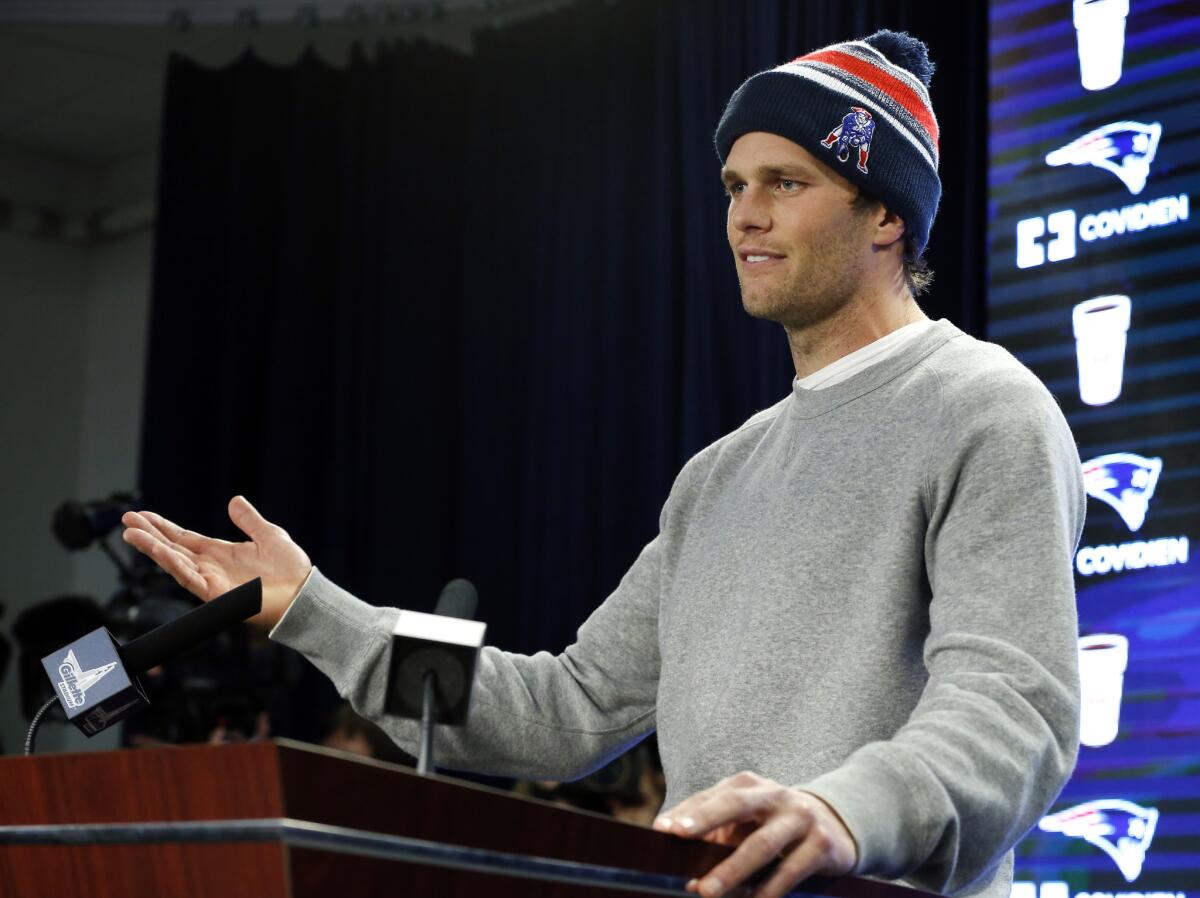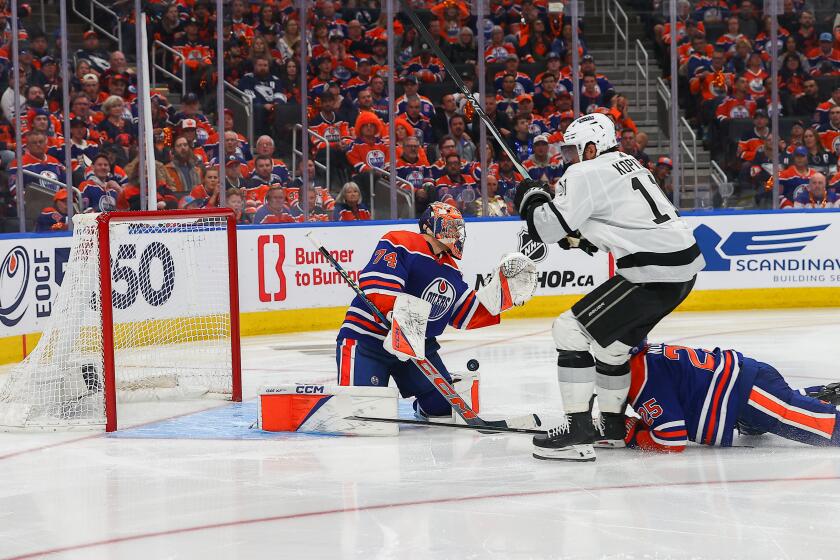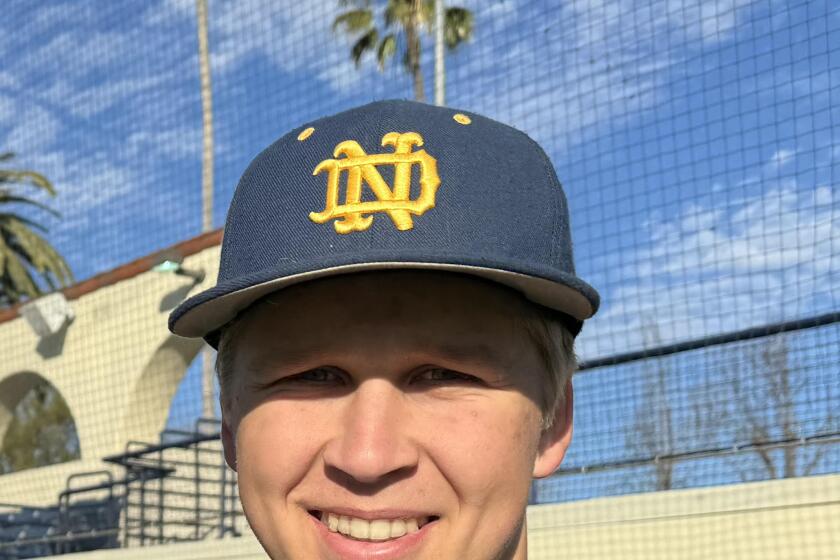Tom Brady’s four-game suspension upheld; quarterback had cellphone destroyed

New England Patriots quarterback Tom Brady speaks at a news conference in Foxborough, Mass., in January.
In any other year, Tom Brady would be focused on the start of training camp.
Now, the star New England Patriots quarterback has his eye on federal court.
Setting the stage for a legal battle royal, NFL Commissioner Roger Goodell on Tuesday upheld Brady’s four-game suspension for his role in using underinflated footballs in last season’s AFC championship game. Goodell also revealed that, just before Brady was to meet with independent investigator Ted Wells in March, the quarterback directed an assistant to destroy his cellphone.
“He did so even though he was aware that the investigators had requested access to text messages and other electronic information that had been stored on that phone,” Goodell said in his decision.
“During the four months that the cellphone was in use, Brady had exchanged nearly 10,000 text messages, none of which can now be retrieved from that device.”
In a recent appeals hearing that lasted 10 hours, Brady acknowledged he was aware of investigators’ request for information from his cellphone before he had it destroyed.
That none of the information on that phone was made available to the league became a major point of contention in the so-called Deflategate controversy.
The NFL Players Assn. said Tuesday it would appeal Goodell’s decision in federal court, presumably in Minnesota — where it has prevailed before in cases against the league — or in the Patriots’ home state of Massachusetts. But the NFL ostensibly beat the union to the punch, quickly filing action in U.S. District Court in New York, saying Goodell has the right under the labor agreement to hand out such discipline “for conduct that he determines is detrimental to the integrity of, or public confidence in, the game of professional football.”
Calling Goodell’s decision “deeply disappointing” and the appellate process “thoroughly lacking in procedural fairness,” Brady’s agent said neither the quarterback nor the Patriots did anything wrong.
“The appeal process was a sham, resulting in the commissioner rubber-stamping his own decision,” agent Don Yee said in a written statement. “For example, the Wells investigative team was given over 100 days to conduct its investigation. Just days prior to the appeal hearing, we were notified we would only have four hours to present a defense; therefore, we didn’t have enough time to examine important witnesses.”
The Patriots, who open training camp Wednesday, said in a written statement they “unequivocally believe in and support Tom Brady,” and called the decision to uphold the suspension “incomprehensible.”
The penalties, which Goodell issued in May, extend well beyond Brady. The commissioner also fined the Patriots $1 million and stripped them of a first-round pick next year, and a fourth-round selection in 2017. The fine is tied for the largest in NFL history, matching that imposed on former San Francisco 49ers owner Eddie DeBartolo in 1999 for his role in a Louisiana riverboat gambling scandal.
The alleged football-deflation scheme marked the second time in eight years the Patriots had been accused of cheating. In 2007, they were caught improperly videotaping the sideline hand signals of New York Jets coaches. That incident, nicknamed Spygate, cost New England Coach Bill Belichick $500,000 — the largest imposed on a coach in league history and maximum permitted under league rules — and the league docked the Patriots a first-round draft pick.
Brady almost certainly will ask in court for an injunction that would delay any suspension until a decision is reached. That would at least allow him to play in the Sept. 10 Kickoff Opener at home against Pittsburgh.
If the suspension were to stay in place, Brady would miss games against the Steelers, Buffalo, Jacksonville and Dallas. He would return to face the Colts — the team that blew the Deflategate whistle on him — in a “Sunday Night Football” game on Oct. 18 in Indianapolis.
Brady’s backup is Jimmy Garoppolo, a second-round pick in 2014.
Last week, multiple media outlets reported that if Brady’s suspension was not lifted entirely, the quarterback’s legal strategy would include his representatives arguing the league’s policy for handling equipment applies to club personnel and not players; that having a “general awareness” of a plan to deflate footballs doesn’t justify punishment; that Brady didn’t have fair notice of the punishment he faced, and that other such instances of alleged tampering with footballs didn’t result in player suspensions.
The Patriots also have questioned the methodology and procedures of Wells in the production of his report.
Others view the quarterback’s decision to destroy his cellphone as crippling to his argument.
“I think it destroys his case,” said Dan Hill, a crisis communications and reputation management expert. “It shows a willfulness to the actions that occurred, and it undermines whatever credibility or goodwill he might have had.”
Said Hill, president of Washington, D.C.-based Ervin/Hill Strategy: “I would say, as quickly as possible and as soon as he has come to terms with his actions, he needs to come forward and apologize and take ownership of it, and try to put this behind him.”
Twitter: @LATimesfarmer
More to Read
Get our high school sports newsletter
Prep Rally is devoted to the SoCal high school sports experience, bringing you scores, stories and a behind-the-scenes look at what makes prep sports so popular.
You may occasionally receive promotional content from the Los Angeles Times.







